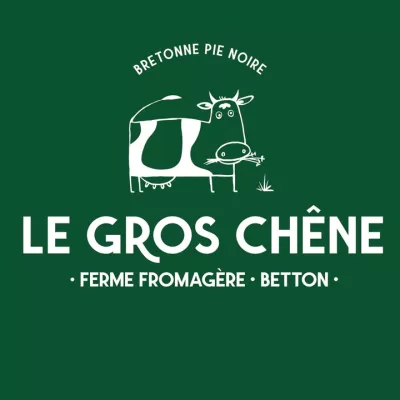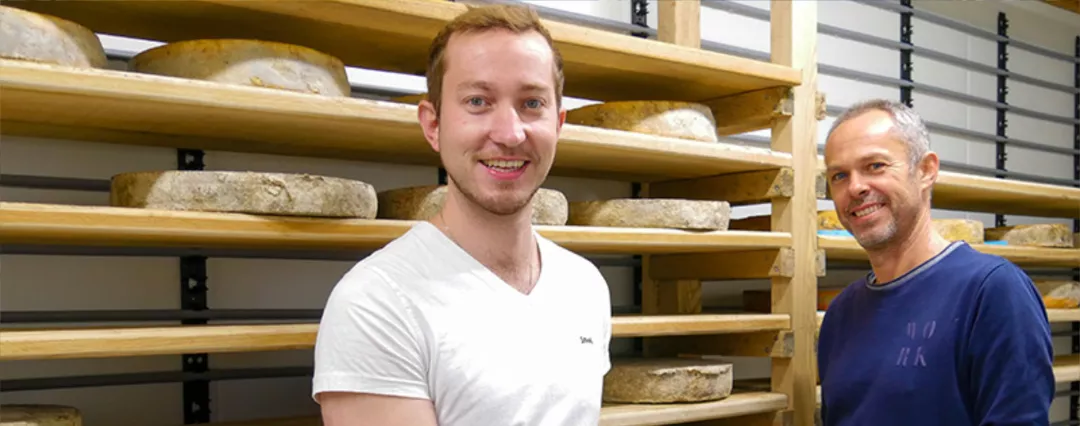General information
RDP Priority
- P2. Competitiveness
- P4. Ecosystems management
RDP Focus Area
- 2A: Farm’s performance, restructuring & modernisation
- 4A: Biodiversity restoration, preservation & enhancement
RDP Measure
- M06: Farm & business development
- M10: Agri-environment-climate
Beneficiary type
- Young farmer
Summary
The Bretonne Pie Noire is a French rare breed of dairy cow native to Brittany. Efforts to preserve it have succeeded in bringing it back from the brink of extinction (in 1973, there were only about 300 remaining), but, with a population of only around 2 500 animals, this endangered breed is still in need of protection.
The founders of the ‘Gros Chêne’ (Large Oak) farm - located near the city of Rennes in Brittany - used farm and business support co-finance from the EAFRD to help buy a herd of 25 ‘Bretonne Pie Noire’ cattle when they launched their activity in 2019. Their project, which also included the development of an on-site factory to produce milk, yoghurts, cheese, and cream, benefited from the RDP agri-environmental-climate measure for the protection of an endangered species and the development of mixed farming activities.
Results
Since 2020, the ‘Gros Chêne’ farm is 100% organic and based on mixed farming practices.
- The farmers keep 25 bovines on 35 hectares, in addition to pigs and goats.
- They have been able to hire an apprentice to help them in their work.
- 100% of their products are sold locally: 20% through a cooperative which aims to maintain small farms; 20% in cheese factories or shops in the area; and the rest as direct sales from their farm.

Promoter
SCEA Le Gros Chêne
Funding
Total budget: 150 000 (EUR)
EAFRD: 24 000 (EUR)
National/Regional: 35 000 (EUR)
Private/own: 91 000 (EUR)
Ressources
Documents
Good Practice Report - Preserving the Bretonne Pie Noire bovine species in the Brittany Region
(PDF – 903.46 Ko)
Liens
Context
In October 2019, a couple left their careers in, respectively, accountancy and the export trade, to establish their own small farm business. They dedicated the first year to the development of a ‘Bretonne Pie Noire’ dairy cow herd. This ‘heritage breed’ is native to France and is an endangered species. In 2020, to support their activity, the farm created a small factory to produce their own cheese, yoghurt, and cream on-site.
Today, they have about 90 animals, including cattle, pigs, goats, and bees. The farm benefited from agri-environmental-climate support to convert to organic farming, and one of the farmers benefited from Rural Development Programme (RDP) support for young farmers.
Objectives
The objectives of the project were to:
- Develop an organic and sustainable agricultural business.
- Contribute to the preservation of the ‘Bretonne Pie Noire’ species and bring added value to the local area.
- Offer a range of dairy products via short supply chains.
- Identify new sustainable solutions for farm management (sustainable energy systems).
Activities
The RDP support contributed to several activities:
- Farm & business development support from the RDP was used for the acquisition of a ‘Bretonne Pie Noire’ herd and for the development of an on-site factory to produce milk, yoghurts, cheese, and cream.
- The farmers also wanted to convert their activity to organic agriculture and develop a mixed farming approach. These actions enabled them to benefit from the agri-environmental-climate measure of the RDP for the protection of an endangered species and the development of mixed farming activities.
Main results
- Since 2020, their production is 100% organic and based on mixed farming. The farmers now keep 25 cattle on 35 hectares, as well as pigs, goats and bees.
- The beneficiaries were able to hire one apprentice to help them in their work.
- 100% of their products are processed on the farm and sold locally: 20% through a cooperative which aims to maintain smallholder farms; 20% in cheese factories or shops in the area; and the rest as direct sales from their farm.
- The farm is open to the public. Families can visit the farm and discover how the products are made.
- The founders plan to develop new activities to become more sustainable. One of their next goals is to become energy self-sufficient by installing solar panels and wind turbines on their farm. They are also considering the further diversification of their business through the production of cereals (e.g. lentils) for human consumption.
Key lessons
- It is really important to determine the business case and objectives of a project before proceeding with an application for support. Before starting their activity, the two farmers were working in relevant fields, respectively as an accountant and in agricultural trade export. They spent six months carefully planning their project and defining their plan, and decided not to use a large investment to start their farm.
- It is also important to consider the location and context of production, in order to ensure that there are viable routes to market for the products. The ‘Gros Chêne’ farm was set up near the urban area of Rennes, which allowed the farmers to easily find a market for their products. The COVID-19 crisis, which started one year after they set up their business, also created a demand for local and sustainable products. This enabled the farmers to sell the entirety of their production from the start.
We decided to develop a medium-sized farm, to be able to produce and transform our products ourselves. We also wish to reinforce the sustainable dimension of our project by transitioning to a self-sufficient energy production while maintaining an organic production.
